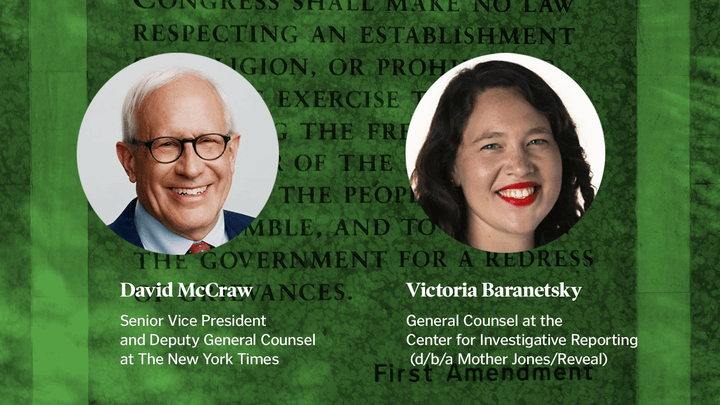On Friday, President Joe Biden signed an executive order that got a lot of headlines because it takes aim at Big Tech, Big Mergers and maybe even Big Media. Biden is urging the Federal Trade Commission to get busy making it more difficult for employers to enforce noncompete clauses in employment contracts. The president’s order says:

(White House)
Noncompete contract clauses are fairly common among television journalists, especially for anchors, who are forbidden from leaving one station and going to the station across town after their contract expires. Other news organizations also impose noncompete agreements on workers, especially if they are higher-profile journalists.
TV journalists often find, after they have not had their contracts renewed or they have been laid off, that they cannot go on the air in the same market because of noncompete clauses. TV stations argue that they put a lot of money and effort into promoting their on-air talent and they have an interest in not seeing competitors benefit from that. Broadcasters in Connecticut, Illinois, Maine, Massachusetts, New York, Utah, Washington and Washington, D.C., have been exempted from noncompete provisions.
[the_ad id=”667826″]
This is far from just a media issue. Restaurants may want to discourage a chef from moving to the competition. Salons want to keep their star stylists.
The FTC estimates that “16 to 18 percent of workers in the United States are subject to a non-compete clause. Further, almost 14 percent of workers who earn less than $40,000 a year are parties to non-compete agreements.”
Indeed, the FTC cited Jimmy John’s, the sandwich store, which tried to enforce noncompete clauses on sandwich makers and forbade them from working at a restaurant within three miles of any Jimmy John’s in the country. The state of Illinois sued and stopped the practice. A dozen states prohibit the use of noncompete contracts with low-wage workers like fast-food restaurant workers.
FTC Commissioner Rebecca Slaughter gave other examples when she testified before an FTC workshop last year:
The examples of how non-competes affect people’s livelihoods and ability to earn a living go on and on.
- A Florida security guard was blocked from working as a security guard in all of Florida, summer camp counselors couldn’t work for competing camps
- An hourly laborer shoveling dirt for an environmental drilling company was prevented from seeking a higher paying job at competing firm
- Low-level customer service employees at a check-cashing business were bound by non-competes
- Coffee shop baristas couldn’t work for another coffee shop within a 10-mile radius for 18 months
- Physicians are also increasingly being subject to non-competes, which means patients can lose their long-time and preferred doctors. According to one survey, approximately 45 percent of primary care physicians are subject to a restrictive covenant that prohibits them from taking patients to a new competing practice.
Noncompete agreements prevent workers from going to a competitor or starting a competing business within a certain period after leaving their previous job. Between 36 million and 60 million private-sector workers were subject to noncompete agreements in 2019, according to estimates by the Economic Policy Institute.
“The only economic leverage that non-unionized workers have is the implicit threat that they could quit and go somewhere else,” Heidi Shierholz, senior economist and director of policy at the Economic Policy Institute, told Yahoo Money. “Noncompete agreements reduce wages. Your employer doesn’t have to pay you bigger wages if they know that you don’t have outside options.”
Limiting noncompete agreements or making them unenforceable — as Biden’s order sets out to do — may not be enough, according to Shierholz. Banning them instead would give workers more leverage, she said.
[the_ad id=”667872″]
California, North Dakota and Oklahoma do not allow noncompete covenants. California not only bans noncompete contracts, it tells employers if they try to force workers to sign them, the workers may sue, even if the employer is not attempting to enforce the noncompete agreement.
The Journal of Law, Economics, and Organization found that noncompete contract clauses stop employees from looking for better pay or positions, even if the state in which they live takes a dim view of noncompete clauses. The threat of legal entanglement stops the employee from looking at other opportunities. For that reason, researchers say, employers often demand an employee to sign a noncompete document even though the state in which they work does not recognize noncompete clauses. The researchers say workers with noncompete clauses tend to stay in their jobs 11% longer and, when they do leave, most do not go to a competitor.
The report says, “Approximately 40% of respondents bound by non-competes — in both enforcing and nonenforcing states — report that a noncompete has been a factor in their declining a job offer from a competitor.”
This article originally appeared in Covering COVID-19, a daily Poynter briefing of story ideas about the coronavirus and other timely topics for journalists. Sign up here to have it delivered to your inbox every weekday morning.
[the_ad id=”667878″]







